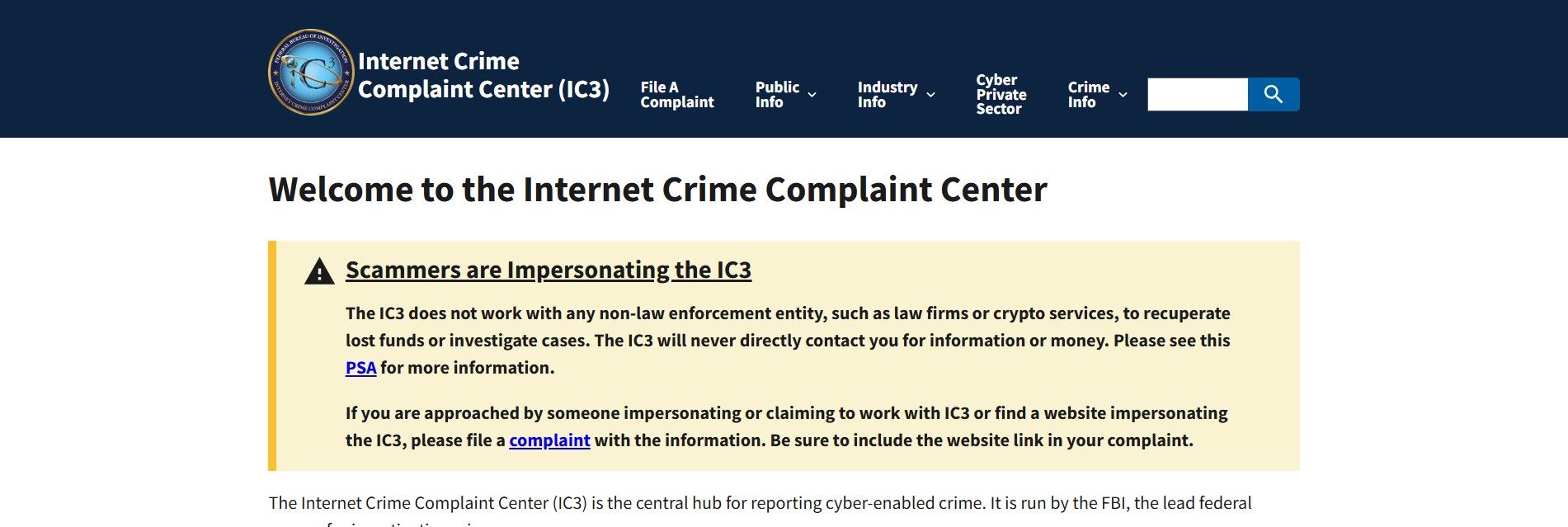The Federal Bureau of Investigation (FBI) has issued a recent Public Service Announcement about threat actors creating spoofed versions of the Internet Crime Complaint Center (IC3) website. These look-alike sites are designed to trick people into believing they’re interacting with the real IC3 site, but their goal is to steal sensitive data, from your name, address, and email to banking information. Because many people visit IC3 to report cybercrime or scams, these fraudsters exploit those legitimate needs to mislead victims.
The FBI Alert

The FBI released a PSA titled “Threat Actors Spoofing the FBI IC3 Website for Possible Malicious Activity.” Here are the key elements of the warning:
- Fraudsters are impersonating the IC3 site using slight domain changes, alternate top-level domains (TLDs), misspellings, or other tricks to mislead visitors.
- These fake sites are gathering personally identifiable information (PII) like name, home address, phone number, email, and financial or banking details.
- The public could run into these spoofed sites while trying to report cybercrimes to IC3. Instead of directing you to the legitimate website, they trick you into giving your information to malicious actors.
Why The FBI Alert Matters

Trust & Safety Erosion: Legitimate users looking to report internet crime could end up victims themselves. If people believe IC3 or the FBI might be compromised, fewer reports may be filed.
Financial Loss & Identity Theft: Once scammers have your personal info or banking data, they can commit identity theft, open accounts in your name, conduct fraudulent transactions, or use your details in other scams.
Victim Follow-On Scams: The impersonation doesn’t always stop with a fake website. Some of these operations promise to recover funds from previous scams, only to require more personal/financial info — or even payment — to do so. (BleepingComputer)
Red Flags & What to Look For

When interacting with websites or claiming to represent government or law enforcement, watch out for these warning signs:
| Indicator | What to Watch Out For |
|---|---|
| URL & Domain | Legitimate IC3 websites always end in .gov (specifically www.ic3.gov). Fake ones may use .com, .org, .net, or misspellings (e.g., ic3-gov.com). |
| Search Engine Links/Sponsored Ads | Fraudsters sometimes pay for ad placement so their spoofed link appears above or beside real results. These “sponsored” links might look like the official site but lead elsewhere. |
| Appearance & Quality | Poor graphics, spelling and grammar mistakes, outdated layout, or missing security indicators (like HTTPS with valid certificate). |
| Requests for Sensitive Information | Legit government websites generally won’t ask for unnecessary personal data or demand payment to restore access, recover funds, or verify identity. If a site asks for banking passwords, full Social Security Numbers (unless absolutely required), or other over‐the‐top data, that’s a red flag. |
| Unsolicited Contact or Offers | If you receive outreach (email, message, social media) claiming to be from IC3, especially offering to help recover lost funds — be very suspicious. Scammers often impersonate government/IC3 personnel in these cases. |
How to Protect Yourself

Go Directly to the Site: Always type www.ic3.gov into your browser’s address bar, rather than following a link from an email or search.
Avoid Sponsored / Ad‐Based Links: If you do a web search, skip the ads or sponsored results. Those are more likely to be manipulated or fraudulent.
Check for “.gov” & HTTPS: Government sites use .gov. They also use HTTPS (a lock icon) for secure connections. If these are missing, do not enter sensitive information.
Verify Website Appearance: Look for official logos, consistent design with what you expect from IC3 or FBI, proper spelling, grammar, etc. If it feels “off,” stop. Less polish can indicate fraud.
Never Share More Than Needed: Only provide required information. Never send money or financial credentials to a site claiming to help you recover lost funds. IC3 does not ask for payment.
Bookmark the Real IC3: To avoid confusion in the future, save a bookmark for www.ic3.gov so you can use the correct site reliably.
Ask for Verification: If someone claiming to be IC3 or FBI reaches out, verify through official channels. Contact your local FBI Field Office using contact information from FBI.gov. Do not use contact info given in suspicious messages.
What to Do If You’ve Already Interacted with a Spoofed IC3

If you believe you’ve been tricked, take action quickly:
Gather Information: Note the website URL you visited, any emails, messages, or phone calls you received. Save copies/screenshots. Document when and how the interaction occurred.
Contact Your Financial Institution: If you shared financial info, such as credit card or bank account numbers, contact your bank or credit card company immediately. Ask them to monitor your account for suspicious activity. Consider closing or freezing accounts if necessary.
Report to IC3 / FBI: Use the official IC3 site (www.ic3.gov) to file a complaint. Be sure to include as much detail as possible: how you got the contact, what you were asked to enter, what you provided.
Report to Other Authorities as Needed: Consider reporting incidents to the Federal Trade Commission (FTC) via ReportFraud.ftc.gov if the spam, phishing, or identity theft spill over. Local law enforcement may also be involved, especially if you suffered financial losses.
Monitor Personal Accounts Closely: Watch for unusual charges or changes. Credit reports and bank statements should be reviewed regularly. Consider identity theft protection services if you think your PII has been compromised.
The FBI’s recent PSA makes clear: cybercriminals are upping their game by impersonating trusted government entities. But with care, knowledge, and verifying the basics, the domain, URL, design, and how you got there, you can avoid becoming a victim. Stay alert, share the word, and always report suspicious websites through official channels.

